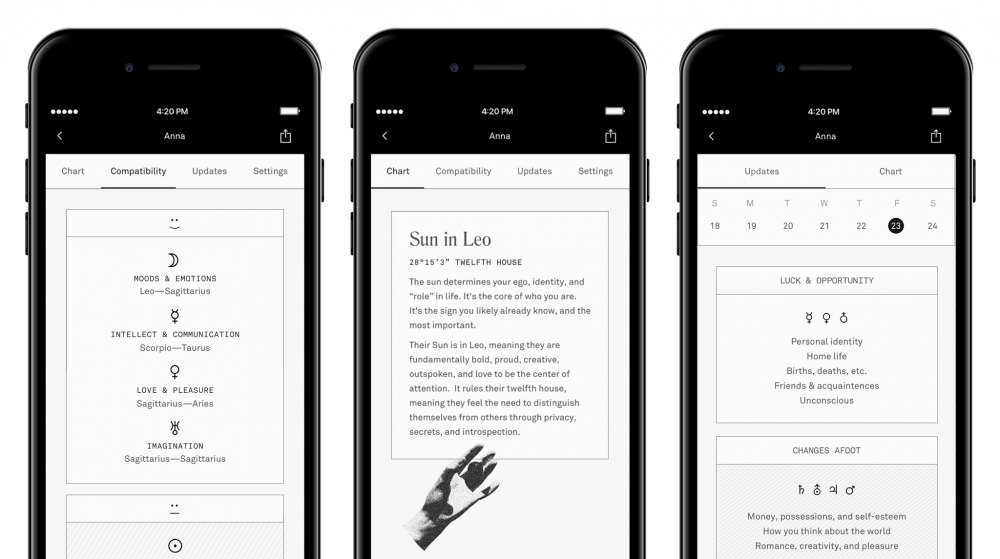I don’t know much about astrology outside of the names of the signs, vague personality traits attached to each, and cool horoscope–inspired tattoos. But there was a brief period in my life when I, bored while eating breakfast, would scroll through the horoscope posts on Snapchat and try to convince myself that they’re either creepily applicable to myself or wildly inaccurate. I had never really looked into regular horoscopes until now, with Co–Star, an app that's growing in popularity.
Co–Star is a popular “AI–powered astrology app with horoscopes, personality analysis, and compatibility.” It launched in October of 2017 as the result of three friends and former co-workers at VFILES—Banu Guler, Ben Weitzman, and Anna Kopp—who wanted to “do something more important for the world than just making a fashion social media platform.” This, in turn, led to astrology and how it can “create a language for people to talk about stuff that is usually kind of hard to say.” Guler recounts a time when she had a surprisingly personal chat with a stranger in an elevator all because she asked what sign the other person was.
Astrology has been an interest of Guler's, as well as her two co–founders, for years now. She believes that it not only “explains the world in a really effective way” and “has really practical uses for building the depth and density of social relations, but also feels like magic.” (I can attest to this whenever I see a relatable horoscope meme).
However, Guler highlights that Co–Star isn’t “corny or weird,” but rather focuses on what you may be feeling or what you should pay attention to or avoid. All of this information presented to the user is gathered from where and when you were born. Armed with this, Co–Star calculates your natal chart using NASA data. Horoscopes are then transcribed from the location of the sun, moon, and planets today versus their placement in your natal chart. Co–Star also includes “the 12 houses of the zodiac [which] each represents a different part of life, like relationships, work, and home.” In short, it’s a lot more thorough than typical horoscope apps.

Much of Co–Star’s popularity can be attributed to how multifaceted and fun it is, but also to its sleek appearance. Guler describes Co–Star as the result of thinking, “let’s re–conceptualize what digital can look like, what your app can look like.” She says the app almost “feels like paper,” with “this sort of tactile richness and depth” to it.
Co–Star is certainly aesthetically pleasing, with its minimalistic interface and black–and–white color theme. It’s clean-cut and sharp, letting its words be the major source of content rather than flashy colors or bold fonts. Its images—graphs depicting planets relative to the moon as an astrological explanation to what you’re feeling and a seemingly–random set of oddities (ranging from owls to stones)—make for an interesting supplement to the writing.
What’s next for Co–Star? Expansion. Guler talks about entering the Android app market soon as well as implementing more social features after the recent friend–compatibility update since “astrology fundamentally functions as social glue.”
Wherever they're headed, it seems like it's in the right direction, given that college kids everywhere are becoming more and more interested in the app. As Sue Park (C '21) says, the app is “weirdly addictive” and its “pretty interface,” only adds to its appeal.
After checking Co–Star every morning for a couple of days now, I found myself really liking it. So, if you’re in any way interested in astrology and horoscopes—or if you just want to see what all the hype is about—maybe you should try out Co–Star too.

